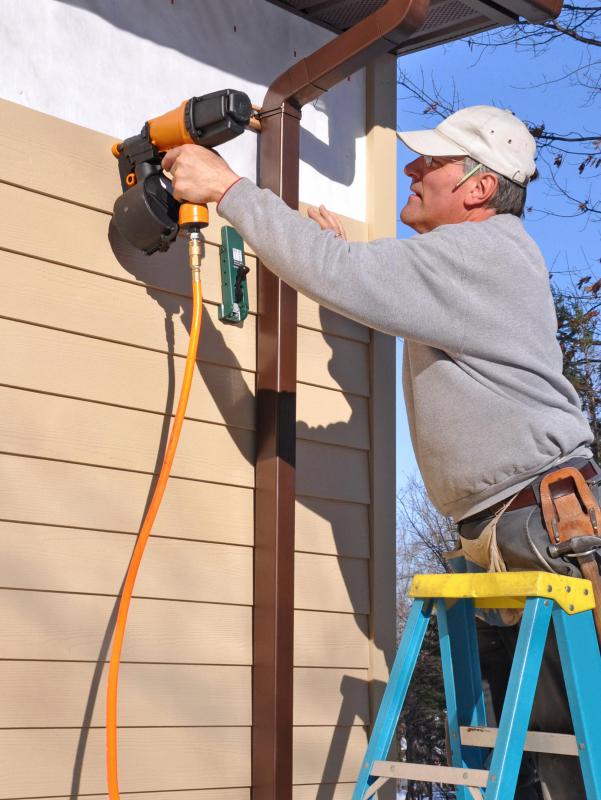At WiseGEEK, we're committed to delivering accurate, trustworthy information. Our expert-authored content is rigorously fact-checked and sourced from credible authorities. Discover how we uphold the highest standards in providing you with reliable knowledge.
What Is Contractor Fraud?
Contractor fraud is a type of fraud against homeowners or business owners in connection with building improvements. Most contractor fraud occurs in the context of renovations, extensions, or major plumbing or electrical work. Contractors will overcharge clients or extort money to finish the job; they will sell and install faulty parts, or simply take money for a job they never performed. In many places, contracting without a license is also a violation of governing fraud law. Different jurisdictions define fraud differently, but fraud always centers on some overt deception.
It takes more than shoddy work to constitute contractor fraud. A contractor who does a poor job can be sued for nonperformance or breach of contract, but he is not liable for fraud unless he made some kind of overt misrepresentation or used the contracting enterprise as a means of extorting money. The crux of fraud is an intentional deception for some tangible gain.

Contractor fraud, which is also commonly called home building fraud or home renovations fraud, concerns shady financial transaction in the construction sector. The simplest example is a contractor who agrees with a homeowner to build an addition, for instance, or renovate a bathroom, but never does the work. This kind of contractor typically requires some or all of the money upfront then disappears without so much as lifting a hammer.

Other times, the contractors will start renovations — tearing down walls, ripping out appliances, and the like — but will then demand more money to continue. They will often cite unexpected costs, more expensive materials, or an original “misunderstanding” as reasons why more money is required to proceed. With their homes in disarray, owners have little choice but to pay whatever the contractor demands. Often times, scams like this can double or triple the agreed-to cost of the construction work.

Identifying contractor fraud before it happens is not always easy. Still, there are several warning signs. A contractor who only accepts cash payments, for instance, is not likely to be legitimate. Similarly, a contractor who insists that a certain price is good only that day, or only for a limited time, may be trying to pressure a client to engage his services.

A contractor who does not have a government-issued contractor’s license should be questioned, as should a contractor who is not willing to procure the necessary building permits for the project he is proposing to undertake. Any contractor who says that a written contract is not necessary or who refuses to put the terms of his work in writing, may be illegitimate. The best way for home and business owners to protect themselves from contractor fraud is to be very proactive when it comes to selecting a contractor, to ask a lot of questions, and get a list of references.
It is often very difficult to remedy contractor fraud once it has been committed, but it is not impossible. Reporting the fraud is the first step. Almost every jurisdiction in the world has fraud laws, and governments are usually very interested in prosecuting violators.
Most local government entities have fraud departments where residents can file complaints against contractors they believe are engaged in fraudulent practices. Many complaint forms are available online. Once a complaint has been processed, the department will likely open up an investigation and may be able to prosecute the contractor if he can be located. If nothing else, reporting fraud can help prevent others from falling victim to the same scams.
AS FEATURED ON:
AS FEATURED ON:














Discussion Comments
@leec: Take photos and try to get documentation of the phone calls you made to him and take him to small claims court. Most small claims courts handle amounts of $5,000 or less. Your county court clerk should be able to tell you how to file.
The good thing is if he doesn't show up to court, it's a pretty good bet the judge will find in your favor. But do have all your paperwork showing what you paid him, etc.
This general contractor was a complete scam. He wanted $5,724.00 with taxes. He deceived me out of $4,000. He was hired to put up 176 feet of 6 foot chain link fence with slats.
After giving him $3,700 for the fence and another check for $300 for the double chain link gate for the materials and labor, he only came to my home with not enough poles, some hardware and a roll of wire that would have been useless for the fence.
His first attempt to set the poles were all out of line. I called and he came over the next day and tried again. I checked the poles the next morning and I could actually pull them straight out of the ground by hand. I called him again the same day and got no answer. I tried several times still no answer.
I had to hire a friend from down the street to help put the fence up properly. While putting up the poles, the contractor had only 3 inches of concrete on the top of each pole. I went into my home to view my security camera, and noticed he actually was placing bags of concrete back into his van.
He had liability insurance, but told me I was not covered for unfinished work. I noticed on also on Angie's List where he states he is bonded. Is there any way I can retrieve any of my funds back?
Post your comments